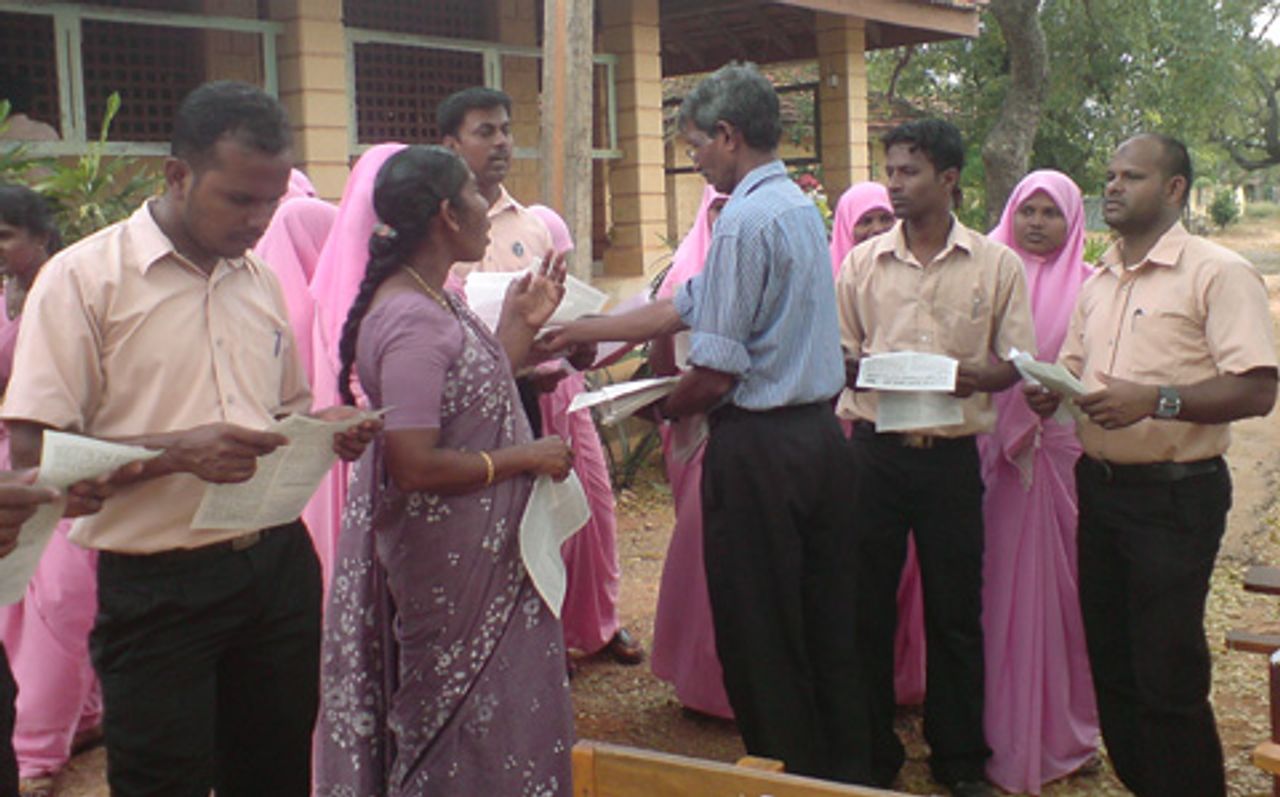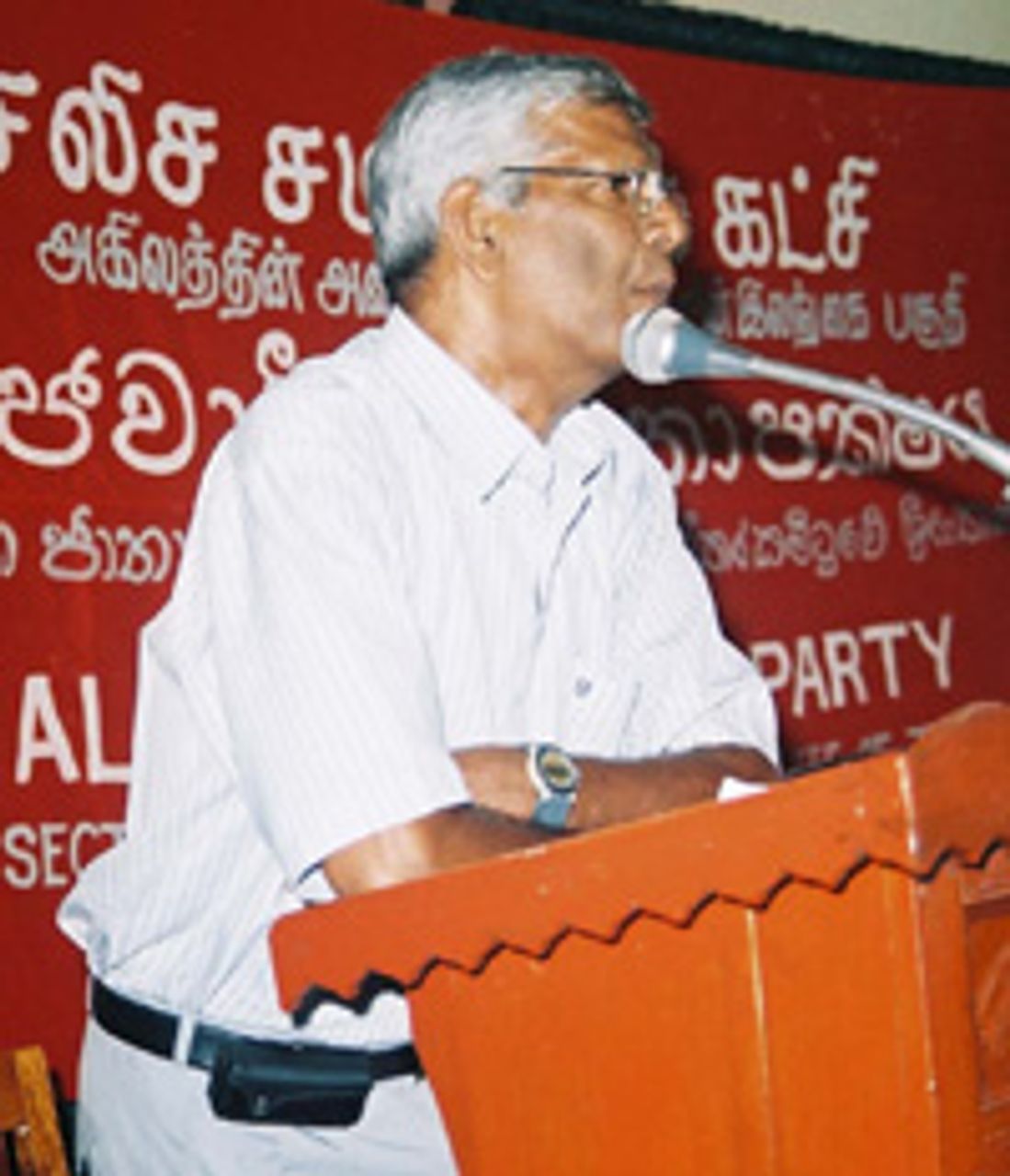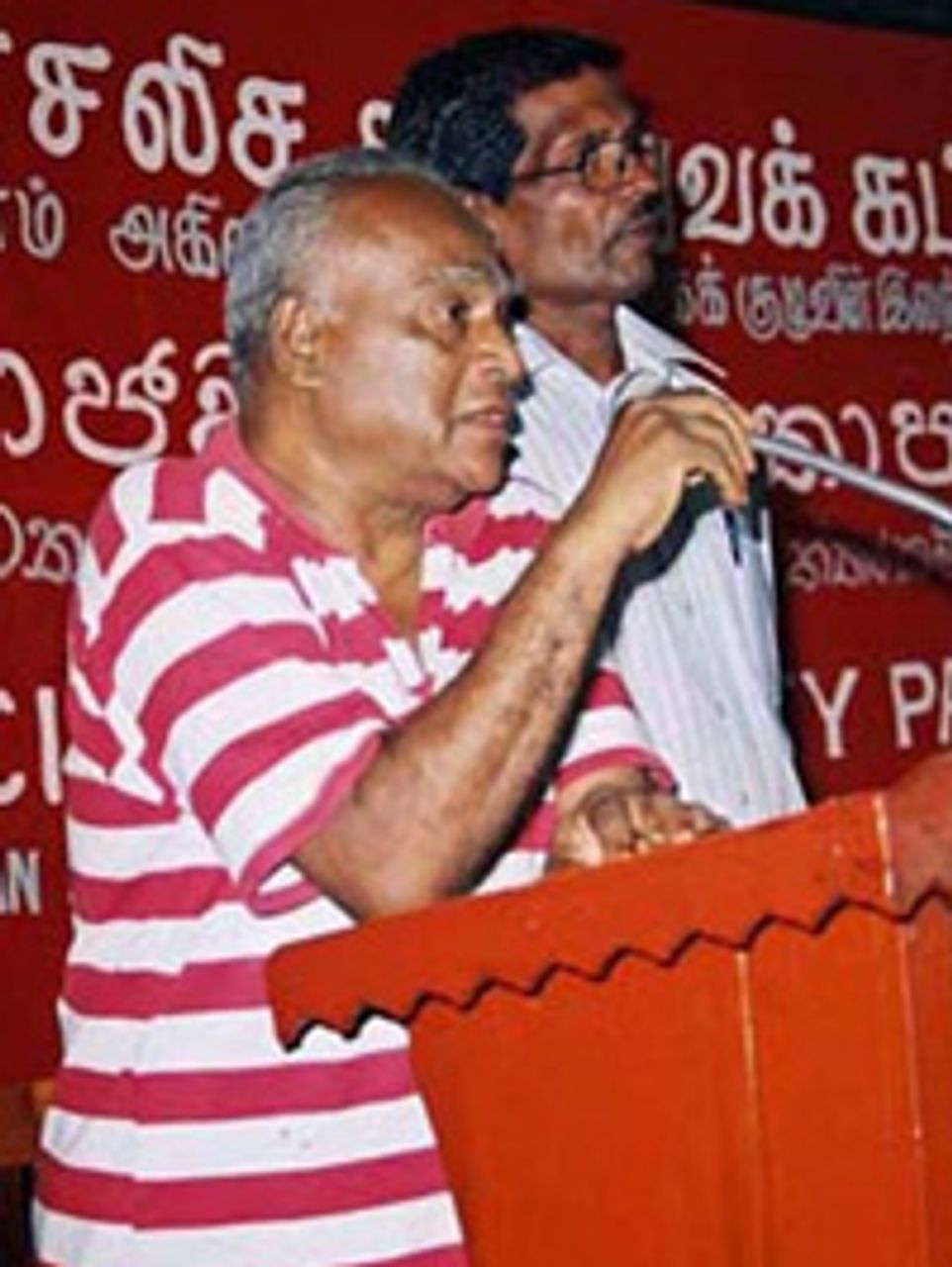The Socialist Equality Party (SEP) held an important public meeting in the war-ravaged northern city of Jaffna on March 21, as part of its campaign for the April 8 general election. Around 100 workers, students, housewives and youth attended from Jaffna, Kayts, Punguduthivu, Vaddukoddai and Nallur.
The meeting was part of a national series. The SEP is contesting the elections with 58 candidates on slates in four districts across the island: Jaffna in the north, Nuwara Eliya in the plantation areas, the capital Colombo and Galle in the south.
For the Jaffna meeting, SEP teams campaigned in several areas, including Jaffna, Vaddukoddai, Kayts, Jaffna University campus and Kopay, distributing about 7,000 copies of the party’s election announcement and other World Socialist Web Site literature. Two meetings were also held at Karainagar and Thirunelveli.
 Kopay trainee teachers discuss SEP policies
Kopay trainee teachers discuss SEP policies
Just two days before the Jaffna meeting, thugs from the Eelam People Democratic Party (EPDP), a Tamil party that forms part of President Mahinda Rajapakse’s ruling coalition, physically attacked and threatened SEP members, including one of the party’s election candidates, K. Chitrakumar, at Vaddukoddai. It was a blatant attempt to intimidate people from attending.
 T. Chandrasekaran
T. ChandrasekaranOpening the meeting, T. Chandrasekaran, who is leading the SEP slate in the Jaffna district, warned: “President Rajapakse called the presidential election two years early. Now he has called the general election and is seeking expanded power for his party. But he postponed the budget. That is because he is preparing austerity measures against the working people. He will use police-state measures against any resistance. Working people have to prepare to meet these threats.”
Chandrasekaran explained that the Colombo ruling elite had used communal discrimination against Tamils since 1948 in order to divide the working class. Citing a resolution in 1976, Chandrasekaran explained that the Tamil bourgeoisie’s reaction to this was to demand its own separate capitalist state.
“That was the program of the Liberation Tigers of Tamil Eelam (LTTE). It sought the support of successive Indian governments to achieve this, but failed. Since the defeat of the LTTE, its former mouthpiece, the Tamil National Alliance (TNA), has been appealing for New Delhi’s support for a Tamil power-sharing arrangement with the Colombo government.” Chandrasekaran explained that against this capitalist line, the SEP insisted that the Tamil masses could secure their democratic rights only through a socialist revolution.
SEP member Kala said the Sri Lankan government was facing an economic crisis because of its long civil war and the world financial turmoil. She continued: “Working people are facing poverty. Many youth have no employment. Students are facing problems continuing their education.”
The speaker explained: “Students and youth cannot find solutions for their problems separately. They must unite with the working class to fight for their rights. We are using this election campaign to politically educate workers and youth of the necessity for a socialist program to fight for their rights.”
SEP Nuwara Eliya district candidate M. Thevarajah emphasised that not only Tamil workers, youth and intellectuals but the working class internationally should learn the political lessons of the LTTE’s failure: “The LTTE’s military defeat signifies the bankruptcy of its separatist and communalist perspective. It represented the interests of the Tamil elite. In order to accomplish its demand for its own capitalist state, the LTTE sought the help of India and the major powers, including the US and European countries.
“When the Rajapakse government restarted the war, the LTTE turned to these powers. But they all backed the Colombo government in the name of ‘defeating terrorism’. The LTTE did not at any time call for the support of Sinhala workers or the Indian or international working class against anti-Tamil discrimination in Sri Lanka. Its terrorist attacks on poor Sinhala people only assisted the Colombo government in its efforts to divide the working class.”
Thevarajah said the Tamil political parties, including the TNA and its dissident faction led by M. K. Sivajilingam, were continuing the LTTE’s politics in other forms: “The working class program is the program of Permanent Revolution advanced by Leon Trotsky. That is, the democratic rights of the oppressed people can be addressed only by a socialist revolution carried out under the leadership of working class. This means uniting Sinhala, Tamil and Muslim workers, with the backing of the Indian and international working class.”
 Nanda Wickremasinghe speaking
Nanda Wickremasinghe speakingJaffna district candidate Nanda Wickremasinghe began by explaining that the 26-year civil war waged by the Colombo governments in the North and East of Sri Lanka was one of the most brutal chapters in the post-World War II history of world capitalism:
“Over 75,000 people were killed in the war, and tens of thousands were detained. Nearly one million Tamils are refugees abroad. The entire population of the northern Vanni area has been dislocated. The government is now preparing to put up 147 permanent military camps in these areas. There is not one person here that has not had the tragic experience of personal loss in the war.
“After brutally suppressing the LTTE, the Colombo government is now calling for an ‘economic war’. Behind this is a mountain of debt, amounting to 4.1 trillion rupees [$US36 billion] or 86.3 percent of the GDP in 2009. The budget deficit for 2009 has risen to 9.7 percent of GDP. Debt servicing consumed 35 percent of total government expenditure last year, and the military consumed another 21 percent.”
Wickremasinghe said the International Monetary Fund had demanded austerity measures in order to slash the budget deficit. After the election, the government would cut wages, slash subsidies to farmers, erode free health and education, and increase taxes. In short, it would launch an unprecedented onslaught on the already impoverished living conditions of the masses.
The speaker explained that in 1976, when the government first deployed large numbers of troops to the Northern Province, the SEP’s predecessor, the Revolutionary Communist League, called upon the working class to raise the demand: “Not a single man for the capitalist war! Not a single cent!” Wickremasinghe emphasised: “From that time on, we demanded the unconditional withdrawal of the Sri Lankan army from the North and the East. We continue to demand it.”
Wickremasinghe said Sri Lanka’s debts to the international banks should be repudiated, and this was part of the fight for the program of international socialism. Drawing attention to the global character of the issues facing the world working class, he said: “The debt crisis that threatens to explode in Sri Lanka is not just a national incident. The Greek debt crisis marks a new stage in the global recession triggered by the collapse of US investment bank Lehman Brothers in 2008. Governments all over the world handed trillions to debt-ridden banks to avoid a complete financial breakdown. Now the Greek government has imposed unprecedented cuts in wages, pensions and social services.”
Referring to the strikes in Greece, Portugal and Spain and across Europe to resist the attacks of governments and employers, Wickremasinghe said a new period of working class struggles had begun in the context of capitalism’s global crisis. The urgent task was to build the world party of the socialist revolution, the International Committee of the Fourth International, to resolve the crisis of working class leadership. As part of this fight, the SEP in Sri Lanka advanced the perspective of a workers’ and farmers’ government in the form of the Socialist Republic of Sri Lanka and Eelam, and a Union of Socialist Republics of South Asia and across the globe.
Several participants spoke to the WSWS after the meeting.
Siva said: “By attending this meeting, I learned about so many issues. It is important that the Sinhalese and Tamil working class should live unitedly and fight for socialism. Parties like the TNA talk about self-rule for Tamils. It is same as with the LTTE in the past. People like to live in unity. We should reject the separatism and communalism. I will talk about these views with my friends. I want to join this party.”
Shree commented on the ongoing military occupation of the North: “I traveled from Vavuniya. You have to pass many checkpoints where documents and bags are checked. Those who do not have proper traveling documents are arrested. One passenger had a temporary identity card. He was taken for questioning at Omanthai and we do not know what happened to him.”
Explaining the problems in the detention camps, where about 95,000 civilians are still incarcerated, Shree said: “Those who are detained in the Vavuniya camps are not receiving sufficient help. Men, women and even elders and children are coming out every morning with temporary passes seeking odd jobs. In the evening they return empty-handed with sorrow to the camps. Students receive no proper schooling.
“There is no major difference between the TNA and its dissidents who have formed new groups. They all are seeking privileges from Colombo. The elites are defending their own class interests, but not those of ordinary people.”
